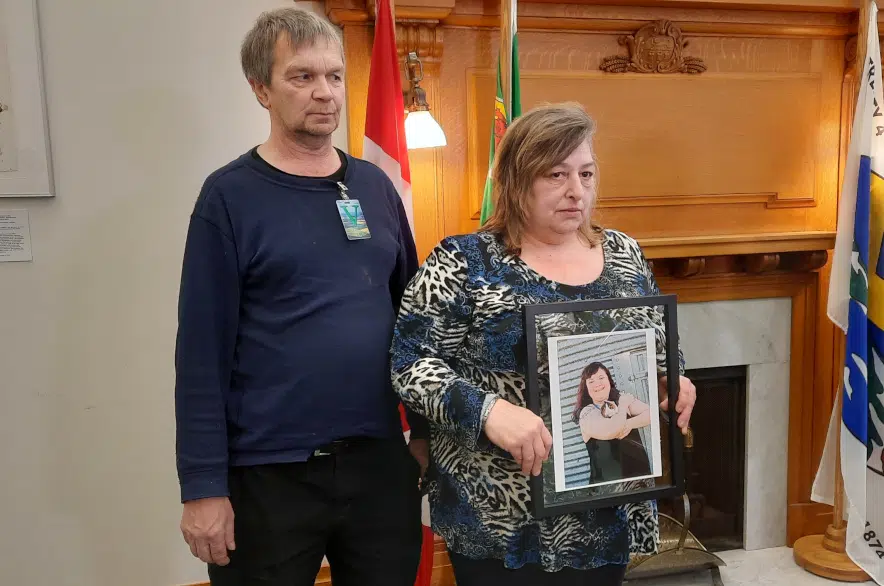Barbara and Barry Stuckey stood together, each in turn gripping a large photo frame with a picture of their 25-year-old daughter Jessica inside — someone they and the Saskatchewan NDP believe needs more support from the provincial government.
Jessica is currently at Saskatchewan Hospital in North Battleford — a psychiatric hospital — but she recently spent 36 days on remand in the Pine Grove Correctional Centre.
Barb said Jessica has the mental capacity of a young child.
Jessica has a genetic disorder called Smith-Magenis syndrome. Among its symptoms are self-injurious behaviours and impulsivity.
“The No. 1 thing that she does that is really listed on that is to threaten the people who are helping you, the people who are doing their best for you. Those are the people that she would threaten; that’s just textbook,” Barb explained during a media conference Tuesday at the Saskatchewan Legislature.
“I was threatened pretty much daily. That’s not what she meant. What she meant is that she wanted me to do what she needed me to do, and she wanted me to do it now, not when I was available, not when it was a good time.”
According to Barb, Jessica exhibited some behaviours when she was young but it got worse after her schooling ended and particularly when the pandemic started and her supports fell short.
“As long as she had that schedule for school and a bedtime and a structured environment, things were much better (and) more manageable,” said Barb.
Recently Jessica was arrested for calling 911 and mental health services to get company, going to the ER and asking for help, and uttering threats.
There wasn’t any room in the Saskatchewan Hospital, according to Barb and the NDP, so Jessica spent more than a month in custody on remand. Barb said having here there was scary; at first she wasn’t getting her medication.
“They had to get her prescriptions all transferred and straightened out. She doesn’t operate well without her medication so it was scary,” said Barb.
“I was expecting to be told that she was beat up or something. But the prisoners she was in there with, they must have seen in her that she couldn’t help (it).”
Jessica was deemed unfit to stand trial, meaning she couldn’t meaningfully participate in the proceedings, so she was sent to the psychiatric hospital for treatment. Barb said that last week at a hearing, a psychiatrist from the hospital said Jessica would have to stay there until there were adequate supports for her in the community.
Almost three years ago, Jessica’s psychiatrist at home recommended she go into a Creative Options Regina (COR) program; Barb described it as a group home in Regina. All that was missing was funding for it from the province.
Barb said they went to Community Living Service Delivery, but they’ve been waiting ever since.
Barb said COR is aware of Jessica and her situation.
“They say they are prepared to deal with her — not, when she utters a threat, say, ‘You’re out of here.’ They’re prepared to deal with her,” she said.
Barb said this situation is making her scared and angry: “I miss my girl.”
Meara Conway, the NDP’s social services critic, said the provincial government has failed to provide appropriate supports for Jessica in the community. Conway said what has happened to Jessica is shocking, but she also claims the government was aware of what was happening every step of the way.
“They could have stepped in and provided supports that were recommended by her psychiatrist (and) supports that were asked for by her mother years ago. They could have stepped in at so many opportunities,” said Conway.
“This government’s inaction on this file is cruel, it’s unconscionable and it’s exorbitantly expensive. This kind of incompetence is not cheap. I challenge the minister of social services to provide one good reason not to step in and fund this woman in an appropriate agency.”
Conway said it’s not about the money, but supporting Jessica at the group home would have been “a drop in the bucket” compared to what the police responses, arrest, incarceration, and treatment at the Saskatchewan Hospital has cost.
Anything less than funding Jessica’s spot with COR would, according to Conway, lose the provincial government all its moral authority on disability issues.
Conway believes it would be unlikely the charges against Conway would go ahead if she were released into the community and prove she can stops the problematic behaviours.
Social Services Minister Gene Makowsky’s office referred a request for comment on this story to Bob Martinook, the executive director of Community Living Service Delivery.
Martinook said the ministry can’t speak to a specific case, but also said the ministry want Jessica and her family to know officials “understand their concerns.”
The statement didn’t give any more information or explanations around Jessica’s case but did quote numbers, saying the ministry supports more than 6,000 people with intellectual disabilities in different kinds of residential services and day programs, and partners with more than 135 third-party service providers.
Martinook’s statement went on to say the ministry’s services are voluntary.
“Where assistance is required, that planning process broadens to include the individual and a core group of people who know, care and are committed to supporting them. Planning with the person is an ongoing process, with regular reviews to ensure appropriate supports are being provided,” the statement said.











